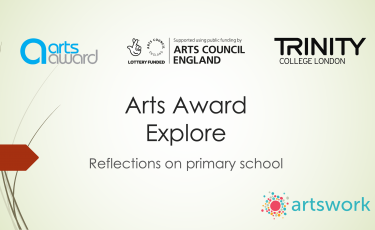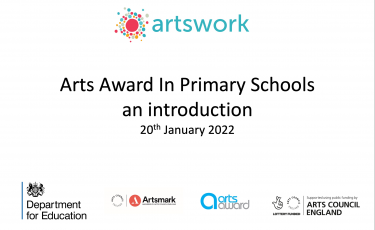#LoveArtsAward Week – An interview with Faye Phillips
Date Created: 27th May 2022

Share this:
Faye Phillips is Education Projects Co-ordinator/Artist Educator at In Focus, and has used her insights to answer some of our questions for #LoveArtsAward week.
In Focus is an organisation providing the South of England with much needed extra-curricular arts-based learning for at-risk and vulnerable young people. While they are trained to offer all levels of Arts Award, they specialise in Discover, Explore and Bronze – all parts
1. Can you tell us a little about the Arts Award you Deliver? What was the project and what level were you working / delivering at?
I deliver a range of Arts Awards, from Discover to Silver. I am currently delivering Bronze Arts Award to a small group of four students at a Pupil Referral Unit in Portsmouth, and also a pair of Looked After Children at our Southampton creative space. Both groups have worked with photography, mixed media and visual art. The group at the PRU in Portsmouth have also done a piece on music writing, specifically rap music with an MC that we brought in to help facilitate these sessions; the students then also created photography based on their lyric writing. These groups meet once a week in term time.
I have also completed 10 Explore awards with two different groups in Hampshire, one in Havant and one in Basingstoke. These two projects were held over the Easter half term and participants created photography and poetry. Each Explore group met everyday for four days to complete their award.
2. Tell us about a valuable connection you made whilst delivering Arts Award. How has your perspective on partnerships changed since working/speaking with them?
I find that with most groups, participants start off shy and quite guarded. With all the groups that I work with, over time they come to feel comfortable and at ease with myself and other adults involved. This is even more apparent when working on projects that meet everyday – such as the Easter Explore projects that I ran.
There was a particular participant in Basingstoke, who at the beginning of the week was unengaged and uncooperative. By taking the time to listen and understand the young person’s needs we formed a meaningful connection which drove him forward on the project, he then attended every day, he even came up with his own creative tasks to complete. At the end of the week he told me how much he enjoyed himself, how he loved taking part and how he will miss everyone involved. He even bought in chocolate to say thank you!
3. How does the Arts Award you deliver help install a sense of ownership in young people over the art they produce and help them create work that reflects their own voice?
By showing the participants creative skills that they previously may have had little experience with, it builds their confidence; confidence they need to express themselves fully. By setting simple creative briefs that they can fulfil and experiment with, it builds their confidence and creativity to put their own spin on things. Often I will set a photographic scavenger hunt, giving participants four words and asking for four pictures in return – they often find this easier than they think, and in doing so I’ve had many examples where young people, after understanding the task and appreciating what I asked them to do, set their own words of their choice to help express themselves.
When holding weekly sessions, such as with the pair in Southampton or the group in Portsmouth, we have time to chat about their interests and art forms that they would like to try out. With these discussions I can then plan a scheme of work that everyone has had some say in and it means there will be an opportunity for them to try something they are truly passionate about. For instance we brought in the MC for the Portsmouth group as they had a keen interest in music. Through this they were able to express themselves through their lyric writing and then again in a visual form.
4. Can you give an example of when delivering your Arts Award had a positive impact on your wellbeing or the wellbeing of the young people you work with?
At the start of new ongoing projects I will speak with the participants about what their interests are, what forms of art they have tried already and what they would like to try with me. Sometimes participants will ask to try an art form that I am yet to experience myself. This means I’ll go away with their ideas and try these new art forms before taking it back to the young people to take part in.
I find this process very good for my own wellbeing – trying new art forms is therapeutic for me, and pushes me to become a better, more well rounded artist. Young people will often respond well to the fact you have taken their idea, gone away and researched it and purchased the materials for them to get stuck into. I’ve spoken with many young people who say that doing art or creative activities is great for their mental health, it gives them an alternative outlet and often doing their arts award means trying new things, experiencing things that they may not have had a chance to yet alongside their peers, giving them a clear confidence boost.
5. Can you tell us about how In Focus’s delivery of Arts Award changed due to Covid19, and what it’s been like returning to work with young people after lockdowns? Have there been any long-term systematic changes?
During covid restrictions and lockdown In Focus delivered online sessions and blended sessions (a mixture of in person and online) depending on the group. We also created remote resource packs for young people to be able to complete their Bronze Arts Award at home at their own pace. These packs included art challenges to complete with a smartphone or tablet, and also included a workbook and pencil case with stationary.
We’ve now created even more remote resources, not just photography based challenges but we now have a design challenge book and a creative writing one too. Personally, in the last 6 months of delivery it has begun to feel like a shift back to pre covid. I still take added precautions, still testing regularly and cleaning all surfaces and equipment as often as possible.
6. In Focus is committed to “Supporting individual well-being through innovative educational services and personal development”. How do you ensure that the Arts Award is a positive experience for all young people taking part in it?
We listen to young people, their needs and wants, and in doing so it gives them a voice. We make sure that all sessions are held in safe and cooperative spaces so young people feel comfortable to engage and express themselves. We want young people to feel safe and listened to and in doing so, we hope that young people feel confident in themselves and their ability to create.
Tags:




